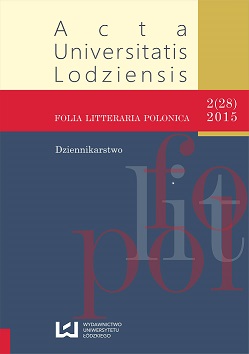Perswazyjnie o warsztacie dziennikarskim (na przykładzie publikacji w rubryce „Media – warsztat” miesięcznika „Press”)
DOI:
https://doi.org/10.18778/1505-9057.28.09Słowa kluczowe:
Press magazine, journalism workshop, journalistAbstrakt
The article is dedicated to aspects of a journalist’s work published between 1996–2014 in the professional monthly magazine Press, aimed at people interested in media, advertisement and public relations. These statements help other media professionals become familiar with the work experience of their colleagues, as well as help acquaint new entrants to the profession with the rules, difficulties and dilemmas associated with this work. The author classifies and defines three types of published texts: those written in an instructional form, those which approach the conventions of an informative article, and finally, copyright protected publications. An analysis of these texts leads to a conclusion that the primary aims of the publication have led its authors to focus attention on perceptions and the practical dimensions of the knowledge being shared. They use detailed descriptions, and have gradually abandoned ready solutions, encouraging readers instead to consider a range of possibilities; they also illustrate their suggestions with examples from personal experience. They do not fail to provide enlightening recollections of their own mistakes or detail the difficult beginnings of their own careers. The role models presented demand from the reader an ability to synthesize various elements. The original structure of the publication as well as its thoughtful and recollection-driven approach to the subject helps to achieve this. An awareness of the technical nature of texts urges experienced journalists to explain in plain terms the ins and outs of the profession by presenting specific events, making comparisons, and offering brief advice or warnings. This also relates to the language of expression they use, which makes even the official and hackneyed style of instructional discourse easy to understand.Pobrania
Bibliografia
Beylin M., Instrukcja wiązania krawata, „Press” 2001, nr 5, s. 48.
Google Scholar
Bojańczyk J., Oswoić modę, „Press” 2005, nr 3, s. 56–57.
Google Scholar
Brzozowicz G., Sposób na artystę, „Press” 1999, nr 3, s. 36.
Google Scholar
Bugajski R., Podręczna instrukcja realizacji materiałów agencyjnych dla telewizji, „Press” 1998, nr 8, s. 35.
Google Scholar
Curtius E.R., Literatura europejska i łacińskie średniowiecze, tłum. i oprac. A. Borowski, wyd. 2, Universitas, Kraków 1997.
Google Scholar
Czejarek R., Czas na Lato, „Press” 2004, nr 7, s. 40–42.
Google Scholar
Druszcz W., Patrzeć fabularnie, „Press” 2006, nr 9, s. 44–46.
Google Scholar
Dunin K., Maszynka sensów, „Press” 2003, nr 9, 39–40.
Google Scholar
Fenstermacher G.D., Soltis J.F., Style nauczania, tłum. K. Kruszewski, WSiP, Warszawa 2000.
Google Scholar
Giełżyński W., Jak układać reportaże, czyli 21 przykazań niezobowiązujących, „Press” 1996, nr 4, s. 26–28.
Google Scholar
Grochowska M., Z buntu, gniewu i z lęku, „Press” 2006, nr 3, s. 53–55.
Google Scholar
Hollender B., Agenci wywiadu, „Press” 2009, nr 2, s. 31–33.
Google Scholar
Jachowicz J., Sztuka podstępu, „Press” 1998, nr 6, s. 28–30.
Google Scholar
Jazownik L., Społeczny sens oraz społeczne funkcjonowanie wartości, aksjologii i edukacji aksjologicznej. Analiza metadyskursywna i jej edukacyjne implikacje, [w:] Czytanie tekstów kultury. Metodologia – badania – metodyka, red. B. Myrdzik, I. Morawska, Wydawnictwo UMCS, Lublin 2007, s. 25–35.
Google Scholar
Kanios A., Teoretyczne podstawy doradztwa zawodowego, http://www.pwsw.pl/download,bmV3c19maWxlcyNhOjE6e3M6NzoibmV3c19pZCI7aTo1MTAyO30jNjA4.html [dostęp: 31.03.2015].
Google Scholar
Kargulowa A., O teorii i praktyce poradnictwa. Odmiany poradoznawczego dyskursu, PWN, Warszawa 2007.
Google Scholar
Kożdoń-Dębecka M., Informacja, [w:] M. Kożdoń-Dębecka i in., Podstawy warsztatu dziennikarskiego, Wydawnictwo Skorpion, Warszawa 2012.
Google Scholar
Krysowata J., Musi nie pasować, „Press” 2004, nr 3, s. 56–57.
Google Scholar
Lindenberg G., Testament prezesa, czyli jak pisać w „Super Expressie”, „Press” 1996, nr 3, s. 15–17.
Google Scholar
Lipko T., Palce między drzwi, „Press” 1999, nr 12, s. 36–37.
Google Scholar
Litania zarzutów, „Press” 2011, nr 2, s. 3–4.
Google Scholar
Marks M., Ważny jest nastrój, „Press” 1998, nr 3, s. 21–22.
Google Scholar
Paradowska J., Bywanie i notes, „Press” 1999, nr 6, s. 44.
Google Scholar
Puzynina J., Język wartości, PWN, Warszawa 1992.
Google Scholar
Ruszpel M., Obcy na pokładzie, „Press” 2012, nr 5, s. 55.
Google Scholar
Skory T., Radioaktywność w Sejmie, „Press” 1999, nr 5, s. 42–43.
Google Scholar
Smoleński P., Musi Cię obchodzić, „Press” 1996, nr 11, s. 44–45.
Google Scholar
Sułek A., Przepis na notę, „Press” 1998, nr 10, s. 58.
Google Scholar
Wittenberg A., Andrzej Skworz. Redaktor naczelny „Press” sam siebie ogłosił moralnym liderem polskich mediów, http://natemat.pl/37461,andrzej-skworz-redaktor-naczelny-press-sam-siebie-oglosil-moralnym-liderem-polskich-mediow [dostęp: 31.03.2015].
Google Scholar
Zielińska-Pękał D., O poradnictwie zapośredniczonym, [w:] Edukacja, wychowanie, poradnictwo w kulturze popularnej, red. E. Kondracka, A. Łysak, b.w., Wrocław 2009.
Google Scholar
Zieliński P., Rysie na antenie, „Press” 2012, nr 8, s. 44.
Google Scholar
Pobrania
Opublikowane
Jak cytować
Numer
Dział
Licencja

Utwór dostępny jest na licencji Creative Commons Uznanie autorstwa – Użycie niekomercyjne – Bez utworów zależnych 4.0 Międzynarodowe.











